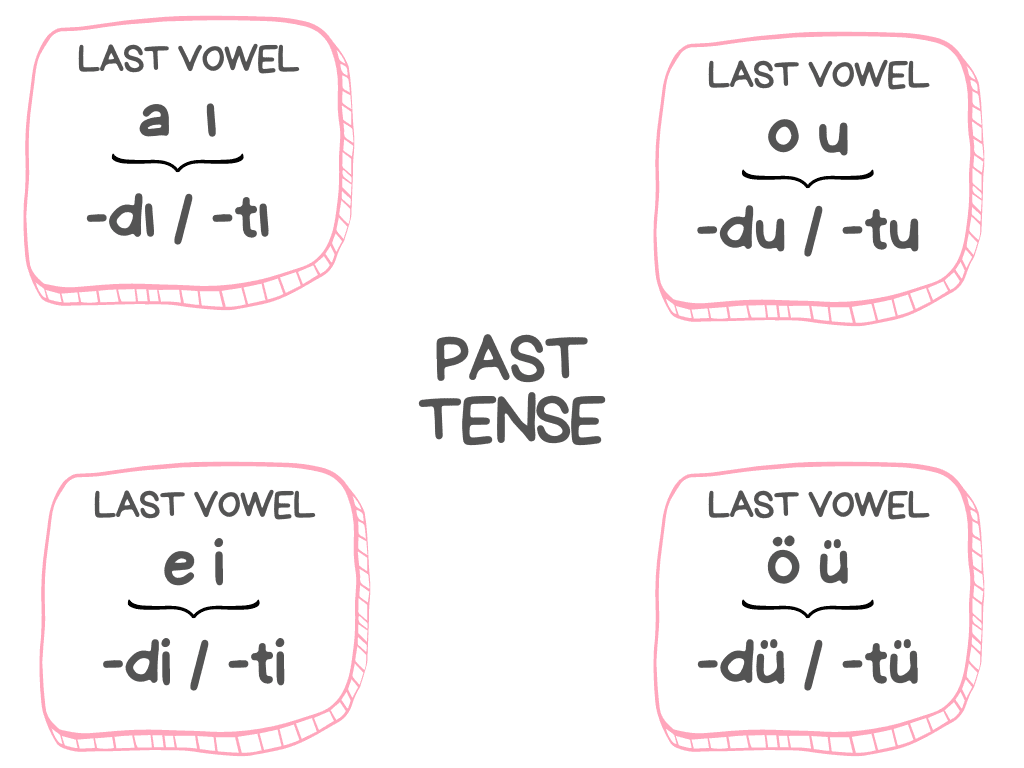Simple past tense -DI and -DU (Belirtili Geçmiş Zaman)
Simple past tense in Turkish is actually very simple :).
The suffix that is used in the past tense of nouns, verbs or an adjectives is -DI or -DU.
-
D →
dort(The f-s-t-k-ç-ş-h-p rule) -
I →
ıori(Vowel harmony i.e ease of pronunciation) -
U →
uorü(Vowel harmony i.e ease of pronunciation)
Don’t be overwhelmed by this formula. The image below explains it all.

📝 The ‘d’ becomes → ‘t’ when the last letter is one of the f-s-t-k-ç-ş-h-p.
Examples
1. Verbs
| Turkish Verb | English Verb | Past Tense (3rd Person Singular) | English |
|---|---|---|---|
| Gelmek | To come | Geldi | came |
| Gitmek | To go | Gitti | went |
| Zıplamak | To jump | Zıpladı | jumped |
| Yapmak | To do | Yaptı | did |
| Uyumak | To sleep | Uyudu | slept |
| Gülmek | To laugh | Güldü | laughed |
- 🟩 - root of verb
- 🟨 - indicator of verb (All verbs in Turkish end with
makormek) - 🟥 - past tense suffix
- 🟦 - last letter of root
2. Adjectives
| Turkish Adjective | English Adjective | Past Tense (3rd Person Singular) | English |
|---|---|---|---|
| Büyük | Big | Büyüktü | It was big |
| Küçük | Small | Küçüktü | It was small |
| Yeni | New | Yeniydi | It was new |
| Eski | Old | Eskiydi | It was old |
| Güzel | Beautiful | Güzeldi | It was beautiful |
| İyi | Good | İyiydi | It was good |
- 🟦 - last letter of word
- 🟧 - separator 'y' between two vowels (only in noun and adjective), not in verbs ❌.
- 🟥 - past tense suffix
3. Nouns
| Turkish Noun | English Noun | Past Tense (3rd Person Singular) | English Translation |
|---|---|---|---|
| Masa | Table | …güzel masaydı. | It was beautiful table |
| Resim | Picture | …büyük resimdi. | It was big picture |
| Arkadaş | Friend | …samimi arkadaştı. | He/she was sincere friend |
| Şehir | City | …büyük şehirdi. | It was big city |
| Yemek | Food | …lezzetli yemekti. | It was delicious food |
| Müzik | Music | ...harika müzikti. | It was great music |
♟️ If the last letter of the word a noun or an adjective is a vowel, ‘y’ comes in between as a separator.
♟️ There is also a non suffix way of expressing past tense by using the word idi after a noun and adjective.
- ♟️ Example would be güzeldi → güzel idi, durusttu → durust idi.
- In this case no need to consider
vowel harmonyorf-s-t-k-ç-ş-h-prules, just add idi to any noun or adjective.
- In this case no need to consider
♟️ There is no irregularity when it comes to past tense of a verb in Turkish. The suffix rules apply the same to all verbs. It is consistent.
Thanks for reading!
Written by
Previous Post
Plural form -lar and -ler in Turkish
Next Post
